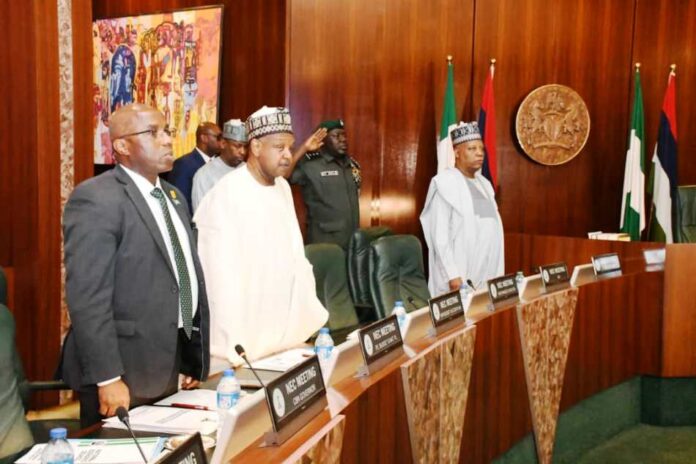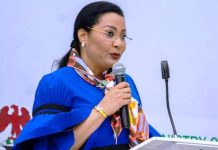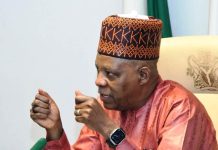……………Observes one minute’s silence for victims of Benue, Plateau attacks.
……………We’re architects of a sustainable future, not mere responders to crises, VP Shettima tells council members.
To reposition Nigeria’s economy and tackle insecurity at its roots, the National Economic Council (NEC) has approved the establishment of a Cotton, Textile and Garment Development Board, alongside new strategies for agribusiness expansion and livestock transformation projected to generate up to $90 billion in economic value by 2035.
Other initiatives approved by council included the establishment of the Green Imperative Project (GIP) national office in Abuja and regional offices across the six geopolitical zones, as well as addressing the crises fuelled by the current system of animal husbandry in the country.
At its 149th NEC meeting held on Thursday at the Presidential Villa, Abuja, NEC also observed a minute of silence for victims of the recent killings in Benue and Plateau States, while expressing its condolences for the people and governments of the affected states.
NEC, chaired by Vice President Kashim Shettima, with Governors of the 36 states of the federation, the Governor of the Central Bank of Nigeria (CBN), the Minister of Finance, and other co-opted government officials as members, approved the proposal for the establishment of the Cotton, Textile and Garment Development Board.
As the regulatory body for the cotton, textile and garment sector of Nigeria, the Board will have governors representing the six geo-political zones, with Ministers of Agriculture and Food Security, Budget and Economic Planning, and Industry, Trade and Investment as members.
The board, when set up, will be domiciled in the Presidency, private sector-driven, with representation of the relevant public sector stakeholders, and funded from the Textile Import Levy being collected by the Nigeria Customs Service (NCS).
NEC also approved the establishment of the Green Imperative Project (GIP) national office in Abuja and regional offices across the six geopolitical zones, as well as the request for support for the formal launch of the National Agribusiness Policy Mechanism.
Addressing issues of empowerment and food security, Vice President Shettima implored members of the Council to be courageous in taking decisions, saying they must “resist the temptation of grand rhetoric and embrace the hard work of reform.
“The nation is watching. Our citizens are not waiting for another speech. They are waiting for results. This Council must remain a meeting point of ideas that move the nation forward. Let us rise above partisan interests and regional divisions and focus on what truly matters—building a nation that delivers for all,” he stated.
VP Shettima reminded members that they were not at the council meeting as a mere routine but by “the resolve to confront the pressing realities that define the lives” of the Nigerian people”, even as he urged them not to just respond to crises, but work as architects of a sustainable future for the nation.
He stated: “Governance, in truth, is not the theatre of promises. It is the solemn business of fulfilment. Today, as always, we are not here to admire the beauty of policy design but to ensure the substance of its execution.
“The task before us is monumental, but it is not unfamiliar. At our last meeting, we launched bold initiatives and reawakened our sense of duty to the nation. Today, we return with even greater clarity about what lies ahead. We must always bear in mind that we are not merely responders to crises. We are architects of a sustainable future.”
On the establishment of a Cotton, Textile and Garment Development Board, the Vice President said it aligns with the economic revival agenda of President Bola Ahmed Tinubu, recalling that the initiative “is a call to resuscitate a sector that once clothed the people and powered the nation’s economy.
Nigeria is a nation where cotton can thrive in 34 states. Yet our production level remains a fraction of our potential. We currently produce only 13,000 metric tons, while we continue to import textiles worth hundreds of millions of dollars. This is not just an economic imbalance. It is an invitation to act,” he added.
Cotton, Textile and Garment Development Board, according to him, will be funded by the textile import levy and will have a presence in all geopolitical zones in the country.
“Our goal is not just regulation. It is a revival. This is our opportunity to re-industrialise, to empower communities, and to restore pride in local production,” he explained.
On strengthening the nation’s food security, the Vice President said even though it is a vital follow-up to the Nutrition 774 Initiative, it is also basically about building an inclusive, efficient and sustainable national food economy.
“We are building a national food economy that is inclusive, efficient and sustainable,” he noted.
VP Shettima maintained that deliberations by NEC must inspire action, deepen unity and uplift the lives of the citizens, and to actualise this, he pushed for the consideration of a “field visit by the NEC Implementation Monitoring Committee.
“This is a critical step in bridging the gap between policy and performance. Our people do not evaluate us by the elegance of our policies, but by the evidence of their impact,” he added.
Other highlights of the meeting are as follows:
UPDATES ON ACCOUNT BALANCES
The Accountant-General of the Federation gave an update to Council on the under-listed accounts as follows:
- EXCESS CRUDE ACCOUNT (ECA), Balance as at April 2025 – $473,754.57
- STABILISATION ACCOUNT, Balance as at April 2025 – N63,535,835,786.60
- NATURAL RESOURCES DEVELOPMENT ACCOUNT, Balance as at April 2025 – N72,858,962,913.29
PRESENTATION ON SKILL DEVELOPMENT IN NIGERIA BY HONOURABLE MINISTER OF EDUCATION TO EQUIP 5 MILLION YOUTH WITH INCOME-GENERATING, INDUSTRY-RELEVANT AND ENTREPRENEURIAL SKILLS BY 2030
The presentation by the Honourable Minister of Education informed the Council that the National Council on Skills had, at its last meetings, chaired by the Vice President, resolved to strengthen and streamline skills development efforts across the country, through the Technical and Vocational Education Training (TVET) initiative.
Council was informed that the TVET system will comprehensively transform skilled education to deliver quality and consistency across all levels. Through a standardised framework that ensures all training programs are properly accredited and certified in a seamless and orderly manner, supported by modernised colleges, an industry-relevant curriculum, sustainable funding and a strong governance structure.
Council was informed that the coordinated and integrated initiative will integrate partnerships with all MDAs, sub-national governments and the private sector.
Council lauded the federal government’s strong commitment to TVET by integrating skills development into national education policies and budgetary allocations.
COUNCIL RESOLUTION:
Council approved key recommendations in the presentation and urged State governors to take advantage of emerging opportunities under the new initiative to train and mentor youths in digital education and skill acquisition to add value to their lives.
Considering the benefits of the programme on job creation and youth empowerment, States were advised to also fully participate in the programme irrespective of political affiliations.
PRESENTATION ON NIGERIA LIVESTOCK GROWTH ACCELERATION STRATEGY BY THE MINISTRY OF LIVESTOCK DEVELOPMENT
The purpose of the presentation is to present the strategy of the newly created Federal Ministry of Livestock Development (FMLD) to the National Economic Council. The strategy is inherited and built on the National Livestock Transformation Plan, NLTP (2018 – 2028), which was focused on modernising Nigeria’s livestock sector, with an emphasis on cattle ranching and peacebuilding.
The strategy is also built on the National Livestock Growth Acceleration Strategy (NL-GAS), refined and extended to transform the sector into an intentional jobs, wealth, exports, and tax / IGR engine.
The presentation projected that the strategy will build a $74B – $90B sector by 2035 in direct partnership between States, the private sector, and foreign investors, under a sound federal regulatory umbrella.
Investments in the programme will prioritise 5 key pillars between 2025-2026. These critical areas of focus include Animal Health and Zoonoses Control, Feed and Fodder Development, and Water Resources Management.
Others are on Statistics & Information Systems and Breed Improvement initiatives as essential components of comprehensive Livestock Value Chain Development across the country.
Council considered several prayers related to livestock development initiatives in Nigeria. The first set of requests included formally endorsing FMLD’s inheritance of NLTP, its strategic priorities and associated implementing assets; transferring to FMLD the prior committed N100 billion in resources approved by NEC to support industry modernization; creating counterpart State Ministries of Livestock Development as appropriate; and gaining access to the pool of technical support and expertise available at the Federal Ministry, particularly for animal health support and disease eradication.
Additionally, the Council reviewed proposals to work together in delivering public good investments critical to transforming Nigeria into a red meat exporter with access to key Middle East and Asian markets. This included partnering with FMLD to attract private investors to the States as well as strengthening existing ones to build an IGR source, national job growth, and export engine.
The final considerations focused on collaboration with the NL-GAS Office to domesticate the new strategy and key into the growing pool of investor engagement. There was also discussion about partnering with sub-nationals to identify key areas of investment priority and positioning on the value chain accordingly via State Investment Companies to generate IGR and jobs.
COUNCIL RESOLUTION:
Council deliberated and endorsed key recommendations of the presentation, especially the focus on addressing the crises fuelled by the current system of animal husbandry in the country.
Council also urged active participation of the sub-nationals and the private sector in operationalising the priorities of the Ministry’s presentation on modern livestock production.
Signed
Stanley Nkwocha
Senior Special Assistant to The President on Media & Communications
(Office of The Vice President)
24th April, 2025






